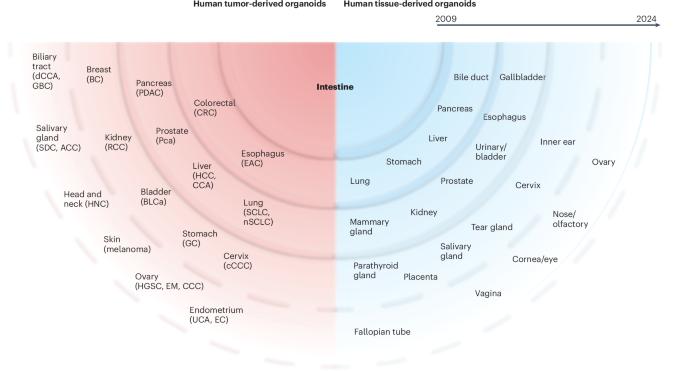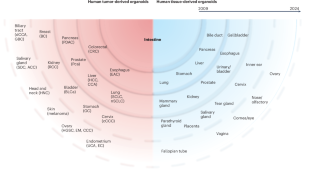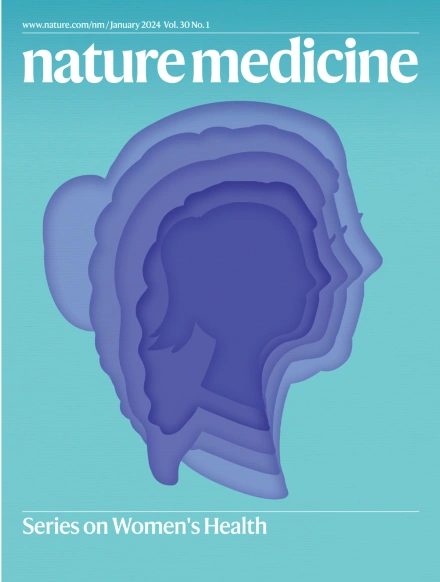Clinical applications of human organoids
IF 50
1区 医学
Q1 BIOCHEMISTRY & MOLECULAR BIOLOGY
引用次数: 0
Abstract
Organoids are innovative three-dimensional and self-organizing cell cultures of various lineages that can be used to study diverse tissues and organs. Human organoids have dramatically increased our understanding of developmental and disease biology. They provide a patient-specific model to study known diseases, with advantages over animal models, and can also provide insights into emerging and future health threats related to climate change, zoonotic infections, environmental pollutants or even microgravity during space exploration. Furthermore, organoids show potential for regenerative cell therapies and organ transplantation. Still, several challenges for broad clinical application remain, including inefficiencies in initiation and expansion, increasing model complexity and difficulties with upscaling clinical-grade cultures and developing more organ-specific human tissue microenvironments. To achieve the full potential of organoid technology, interdisciplinary efforts are needed, integrating advances from biology, bioengineering, computational science, ethics and clinical research. In this Review, we showcase pivotal achievements in epithelial organoid research and technologies and provide an outlook for the future of organoids in advancing human health and medicine. Organoid research is moving beyond developmental and disease biology, driving insights into current and emerging health threats and enabling personalized and regenerative medicine applications.


人体器官组织的临床应用
类器官是创新的三维和自组织细胞培养的各种谱系,可用于研究不同的组织和器官。人类类器官极大地增加了我们对发育和疾病生物学的理解。与动物模型相比,它们提供了一种针对特定患者的模型来研究已知疾病,并且还可以深入了解与气候变化、人畜共患病感染、环境污染物甚至太空探索期间的微重力有关的新出现和未来的健康威胁。此外,类器官显示出再生细胞治疗和器官移植的潜力。尽管如此,广泛的临床应用仍然存在一些挑战,包括启动和扩展的效率低下,模型复杂性的增加以及升级临床级培养和开发更多器官特异性人体组织微环境的困难。为了充分发挥类器官技术的潜力,需要跨学科的努力,整合生物学、生物工程、计算科学、伦理学和临床研究的进展。在这篇综述中,我们展示了上皮类器官研究和技术的关键成果,并展望了未来类器官在促进人类健康和医学方面的前景。
本文章由计算机程序翻译,如有差异,请以英文原文为准。
求助全文
约1分钟内获得全文
求助全文
来源期刊

Nature Medicine
医学-生化与分子生物学
CiteScore
100.90
自引率
0.70%
发文量
525
审稿时长
1 months
期刊介绍:
Nature Medicine is a monthly journal publishing original peer-reviewed research in all areas of medicine. The publication focuses on originality, timeliness, interdisciplinary interest, and the impact on improving human health. In addition to research articles, Nature Medicine also publishes commissioned content such as News, Reviews, and Perspectives. This content aims to provide context for the latest advances in translational and clinical research, reaching a wide audience of M.D. and Ph.D. readers. All editorial decisions for the journal are made by a team of full-time professional editors.
Nature Medicine consider all types of clinical research, including:
-Case-reports and small case series
-Clinical trials, whether phase 1, 2, 3 or 4
-Observational studies
-Meta-analyses
-Biomarker studies
-Public and global health studies
Nature Medicine is also committed to facilitating communication between translational and clinical researchers. As such, we consider “hybrid” studies with preclinical and translational findings reported alongside data from clinical studies.
 求助内容:
求助内容: 应助结果提醒方式:
应助结果提醒方式:


